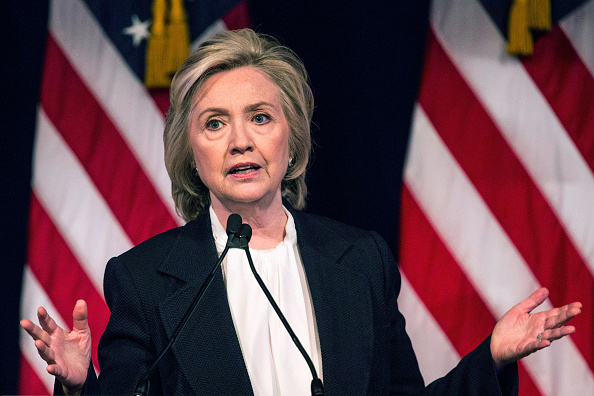
Uber hitched an unexpected ride on the 2016 campaign trail this week.
During a rollout of her economic plan Monday, Democratic frontrunner Hillary Clinton took companies like Uber to task for not giving drivers benefits. On Friday morning, Republican presidential candidate Jeb Bush plans on hailing an Uber in San Francisco to show his support for the ride-sharing company and others like it.
For some Republicans, the contrast made Clinton an easy target.
Rep. Elise Stefanik of New York, the youngest woman ever elected to Congress, argued the former Secretary of State was out of touch with the younger generation. “If you look at millenials, we love those companies [like Uber], we love consumer choices,” she said. “It’s a big mistake, I think, that Secretary Clinton chose to go after those companies that are really disrupting those industries for the better.”
But the politics of Uber aren’t so clear cut for either side.
While Republicans love the idea of breaking taxi unions, GOP support for the sharing economy isn’t so clear-cut. Most of the sharing economy vanguard—companies like Uber, AirBnB and Lyft—were born in California, a big blue state, and their corporate blueprints assume the kind of large social safety net favored by Democrats.
As Uber CEO Travis Kalanick told reporters in Washington in November, the Affordable Care Act was “huge” for his company because the “democratization of those types of benefits allow people to have more flexible ways to make a living.” In other words, his company didn’t have to provide health insurance because drivers could buy it on their own through Obamacare. (That was eight months before a California court ruled that Uber drivers are, in fact, employees and thus were owed typical benefits, a decision the company is appealing.)
Democratic Sen. Mark Warner of Virginia, who built a fortune in cell phone technology, calls it “the gig economy.” Part-time or temporary workers already account for 40.4% of the workforce, up from 35.3% in 2006. Many of these workers have several jobs doing things like driving for Uber, renting out their couch through Airbnb or doing freelance journalism, software coding or videography. These jobs provide workers with flexibility and give them an alternative to unemployment, but the drawback is that they don’t come with the standard package of benefits most full-time workers have long enjoyed.
Underlining Clinton’s concerns about the gig economy, Jake Sullivan, one of her top policy advisors, told a group of Washington journalists at a breakfast Tuesday organized by the Christian Science Monitor that there’s no easy answer. “It’s a huge question and a very hard one,” he said.
While Clinton faces the risk of looking uncool by criticizing companies like Uber, Bush faces an even tougher question. After all, repealing Obamacare is at the top of every 2016 Republican candidates’ list. It’s one thing to ride in an Uber, but quite another to figure out how to fix its business model if the safety net shrinks.
But if the 2016 candidates are just skirting around the edges of the issue, Congress has barely touched it.
A self-described pro-business moderate, Warner is just about the only one on Capitol Hill thinking about these issues. He’s exploring legislation that would help freelancers, such as creating an Obamacare-type program for retirement benefits or building off the model that some trade unions have for contract workers to receive benefits. He also is looking to revamp the tax code to create a category for “dependent workers,” a hybrid between a contractor and a full-time employee that would end the debates, if not the legal challenges, on exactly what kind of an employee gig economy workers are.
But Warner is months, if not years, away from legislation and little is likely to pass before the election, regardless. Which leaves the issue open for debate among the 2016 field. Where should workers in the gig economy get benefits: from their employers or the government?
More Must-Reads from TIME
- Donald Trump Is TIME's 2024 Person of the Year
- Why We Chose Trump as Person of the Year
- Is Intermittent Fasting Good or Bad for You?
- The 100 Must-Read Books of 2024
- The 20 Best Christmas TV Episodes
- Column: If Optimism Feels Ridiculous Now, Try Hope
- The Future of Climate Action Is Trade Policy
- Merle Bombardieri Is Helping People Make the Baby Decision
Contact us at letters@time.com